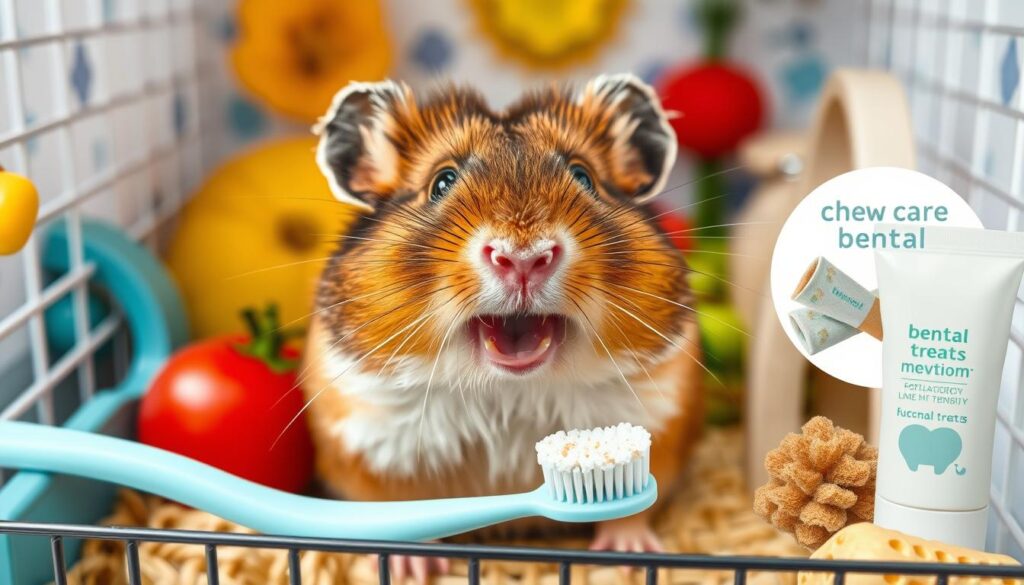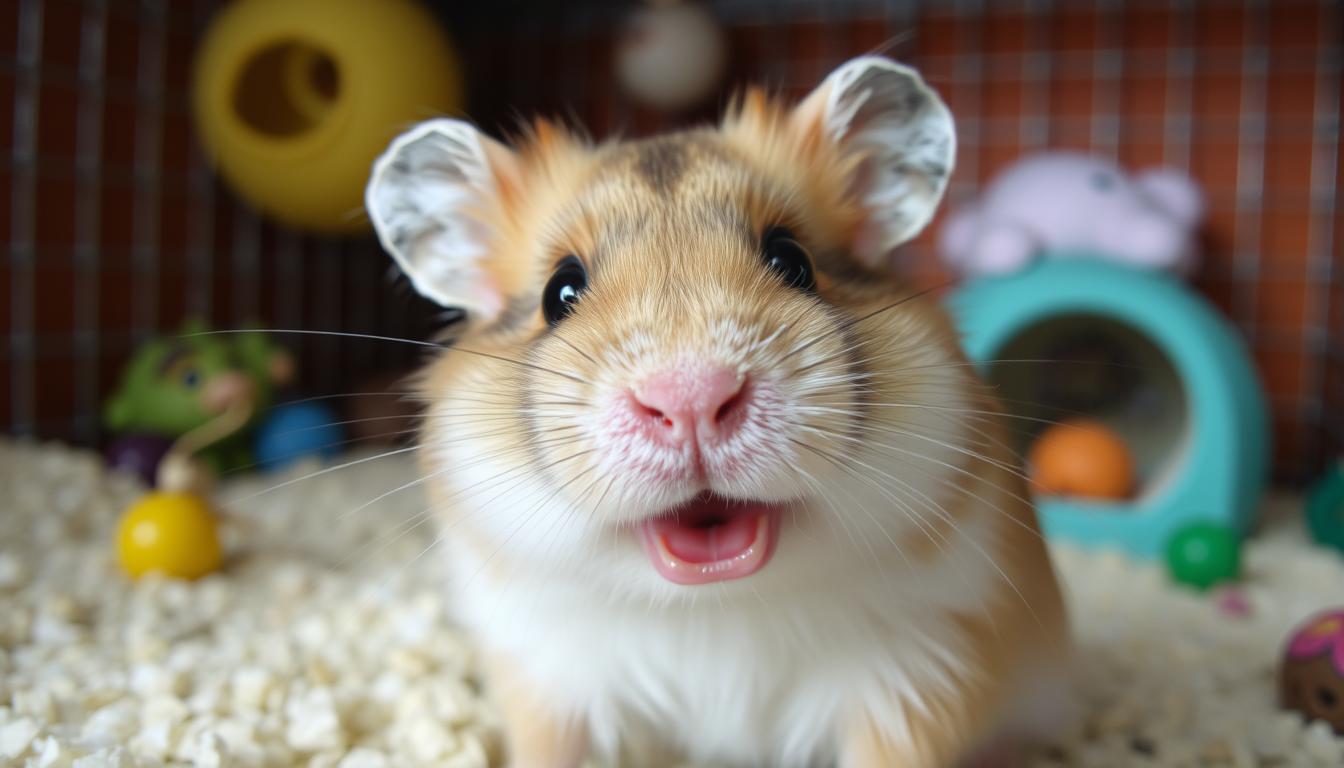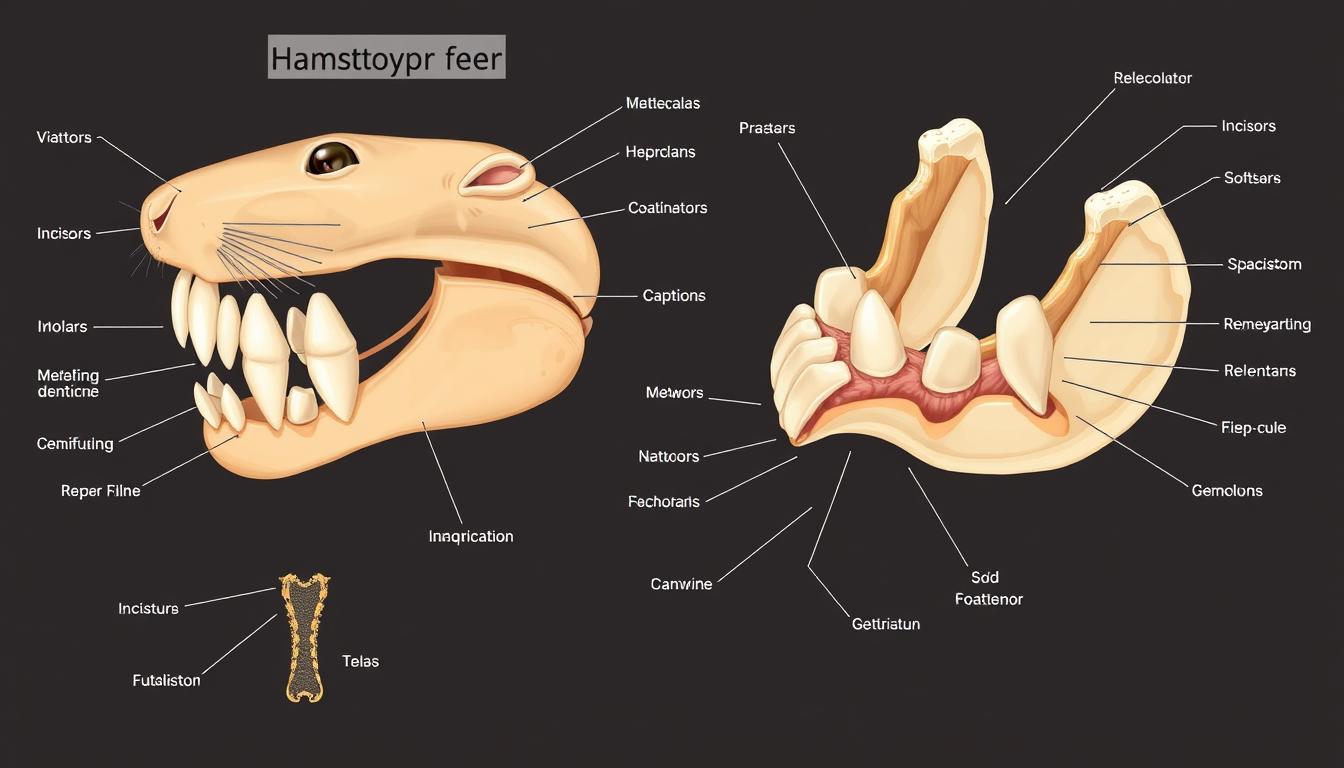Have you ever thought about your hamster’s dental health? How many teeth does a hamster have, and why is it important? This guide will dive into the world of hamster dentistry, answering these questions and more.
Key Takeaways
- Hamsters have a unique dental anatomy with specialized teeth for chewing and grinding their food.
- Understanding the total number of teeth and their development can help you identify potential dental issues early.
- Maintaining your hamster’s dental health is crucial for their overall well-being and longevity.
- Proper diet and regular veterinary check-ups are essential for ensuring your hamster’s teeth remain healthy.
- Recognizing the signs of dental distress can help you provide timely and effective care for your furry companion.
Understanding Hamster Dental Anatomy
To care for your hamster’s teeth, knowing their dental structure is key. Hamsters, unlike dogs or cats, have unique teeth. This makes their dental care different.
Types of Teeth in Hamsters
Hamsters have 16 teeth, divided into four types:
- Incisors: These sharp, front teeth are for gnawing and chewing. They have two upper and two lower incisors.
- Premolars: Hamsters have two premolars on each side of their upper and lower jaws. These help grind and chew food.
- Molars: At the back, the four molars in each jaw grind and crush their diet.
The Unique Structure of Their Teeth
Hamster teeth grow continuously, unlike human teeth. This is crucial for their dental health. They must chew constantly to prevent their teeth from growing too long.
Hamster teeth have a hard, enamel-like front and a softer back. This unique structure keeps their incisors sharp. It’s important for their natural behaviors like burrowing and foraging.
“Proper understanding of your hamster’s dental anatomy is the first step in ensuring their overall well-being and preventing common [overgrown hamster incisors] and [rodent dental care] issues.”
Total Number of Teeth in Hamsters
Hamsters have a unique dental anatomy. It’s key for owners to know how many teeth their pets have and how they change. This info helps in caring for your hamster’s teeth and fixing problems like hamster tooth trimming or malocclusion in hamsters.
Adult vs. Baby Hamster Teeth Count
Adult hamsters have 16 teeth, while baby hamsters start with 12. As they grow, baby teeth fall out and adult teeth grow in. This happens between 3-6 weeks old.
- Adult hamsters have 4 incisors (front teeth), 4 premolars, and 8 molars.
- Baby hamsters have 4 incisors and 8 molars, but no premolars.
The number of teeth can vary slightly among hamster species. But the main pattern stays the same. Watching your hamster’s teeth grow helps spot dental problems early.
Good dental care, like hamster tooth trimming, is vital. It keeps your hamster healthy and prevents malocclusion in hamsters. Knowing about your pet’s dental anatomy ensures they live a happy, healthy life.
Importance of Healthy Teeth for Hamsters
Keeping your hamster’s teeth healthy is key to their happiness. Bad teeth can cause many problems that hurt their life quality. Knowing how important teeth are helps you care for your hamster better.
Effects of Poor Dental Health
Hamsters with bad teeth face many issues. They might have trouble eating, feel pain, and even face serious health risks. Overgrown teeth can make eating hard, lead to malnutrition, and cause pain. Dental infections can spread and harm organs, even leading to failure.
Signs of Dental Problems
It’s important to watch for signs of unhealthy hamster teeth and hamster dental problems. Look out for:
- Excessive drooling or saliva production
- Difficulty or reluctance to eat
- Discolored or swollen gums
- Visible overgrowth or misalignment of teeth
- Lethargy or decreased activity level
If you see these signs, see a vet who knows about small animals. Early treatment can stop bigger problems and keep your hamster happy and healthy.
“Maintaining your hamster’s dental health is crucial for their overall well-being. Unhealthy hamster teeth can lead to a variety of problems that may significantly impact their quality of life.”
Diet and Hamster Dental Health
Keeping your hamster’s teeth healthy is key to their happiness. What they eat is very important. It helps prevent tooth problems and keeps their teeth in good shape.
Recommended Foods for Good Oral Hygiene
Give your hamster foods that are crunchy and hard. These help wear down their teeth as they grow. Good choices include:
- Hay, such as timothy or meadow hay
- Carrots, apples, and other hard fruits and vegetables
- Unsweetened cereal or whole-grain bread
- Rodent-safe chew toys made of wood or other safe materials
Foods to Avoid for Healthy Teeth
But, some foods are bad for their teeth. Avoid these to keep their teeth healthy:
- Sugary treats, such as cookies or candy
- Soft, sticky foods that can get stuck in their teeth
- Highly processed or high-fat snacks
Choosing the right food and giving them things to chew on is important. It helps keep their teeth strong and healthy. This avoids expensive dental problems later.
How Hamsters Use Their Teeth
Hamsters are fascinating creatures, and their teeth play a crucial role in their daily lives. These small rodents have a unique dental anatomy that allows them to chew and grind their food effectively. By understanding how hamsters use their teeth, you can better appreciate the importance of maintaining their dental health.
Chewing and Grinding
Hamsters are known for their incessant chewing behavior. Their sharp, continuously growing incisors are designed for gnawing and grinding. Hamsters use these teeth to break down hard foods, such as nuts and seeds, into smaller, more manageable pieces. This chewing action not only helps them consume their meals but also helps to keep their teeth from becoming overgrown and problematic.
Behavior and Tooth Wear
In addition to chewing, hamsters also engage in a behavior known as “bruxism,” or teeth grinding. This behavior, which is often seen when the animal is resting or relaxed, helps to wear down their teeth and maintain a healthy dental profile. Proper tooth wear is essential for hamsters, as overgrown hamster incisors can lead to various health issues, such as difficulty eating and even pain.
Observing your hamster’s chewing and grinding behaviors can provide valuable insights into their overall dental health. If you notice any concerning changes, such as excessive or unusual chewing patterns, it’s essential to consult with a veterinarian to address any potential [dental problems].
“Proper dental care is crucial for the overall health and well-being of your hamster. By understanding how they use their teeth, you can take proactive steps to ensure their teeth remain healthy and functional.”
Regular Dental Care for Hamsters
Keeping your hamster’s teeth healthy is very important. Hamsters have special teeth that need regular care. This helps avoid problems like hamster tooth filing and more. With a few easy steps and the right tools, you can keep your hamster’s teeth in top shape.
Tips for Maintaining Your Hamster’s Teeth
- Make sure to take your hamster to the vet for dental checks often.
- Feed them a mix of crunchy, fibrous foods to wear down their teeth.
- Give them chew toys and wooden blocks made for hamsters to chew on.
- Use a soft-bristled toothbrush and pet-safe toothpaste to gently brush their teeth.
- Trim their nails often to stop them from getting caught in their teeth.
Tools for Hamster Dental Hygiene
Along with a good diet and chew toys, there are tools to help keep your hamster’s teeth clean:
- Hamster-safe toothbrush: Find a small, soft-bristled brush made for small pets.
- Pet-friendly toothpaste: Pick a toothpaste made for small animals, not human toothpaste.
- Dental treats: Special treats can help remove plaque and tartar from their teeth.
- Wooden chew toys: Blocks, sticks, and other wooden toys help with hamster tooth filing.

By using these tips and tools, you can keep your hamster’s teeth healthy. This prevents hamster tooth issues and keeps them happy and comfortable.
Common Dental Issues in Hamsters
Hamsters are cute pets, but they can have dental problems. Two big issues are overgrown hamster incisors and tooth loss.
Overgrown Teeth
Hamsters have teeth that grow all their lives. This helps them chew and forage. But, if their teeth grow too long, it can cause malocclusion in hamsters.
Malocclusion happens when teeth don’t fit right. This can make teeth grow too long and not align properly. Things like not enough chew toys, bad diet, and genetics can cause this.
It’s important for owners to watch their hamsters’ teeth. They should give them toys and food that help wear down teeth naturally.
Tooth Loss and Other Problems
Hamsters can also lose teeth due to injury, illness, or old age. Losing teeth makes it hard for them to eat and stay healthy. Other problems like abscesses, infections, and gum disease can also happen if their teeth aren’t cared for.
It’s key to take your hamster to the vet regularly. This helps prevent and fix dental issues like overgrown hamster incisors and tooth problems.
When to See a Veterinarian
As a dedicated hamster owner, it’s key to watch your pet’s dental health closely. A good diet and regular grooming help a lot. But, sometimes, you’ll need to see a vet. Knowing when and what treatments are available helps you care for your hamster best.
Signs of Dental Distress
It’s important to monitor your hamster’s teeth and mouth health. Look out for these signs of dental trouble:
- Difficulty eating or not wanting to eat
- Too much drooling or blood in the mouth
- Discolored, swollen, or infected gums
- Teeth that are too long, crooked, or broken
- Feeling tired or acting differently
Veterinary Treatments for Dental Problems
If you see any of these signs, take your hamster to the vet. Your vet might suggest:
- Tooth Trimming: They can trim teeth that are too long or crooked.
- Tooth Extraction: Sometimes, they need to pull out unhealthy hamster teeth to stop pain.
- Antibiotics and Pain Medication: They might give antibiotics and pain meds for infections or pain.
- Dietary Adjustments: They might suggest a new diet to help your hamster’s teeth and healing.
Regular vet visits are vital for your hamster’s health. Being proactive and getting help when needed ensures your hamster lives a happy, healthy life.
Dental Health Myths About Hamsters
There are many myths about hamster teeth that can harm their dental health. It’s important to know the truth to keep your hamster healthy. Let’s look at some common myths and the facts every hamster owner should know.
Debunking Common Misconceptions
Many think hamsters’ teeth naturally wear down, so they don’t need dental care. But, their teeth grow continuously, and they still need help to stay healthy. Proper rodent dental care is key to avoid preventing hamster tooth issues like overgrowth.
Some believe chewing hard objects, like wooden blocks, keeps teeth healthy. While it helps, it’s not enough. Regular dental trims by a vet or a skilled owner are also needed.
“Neglecting dental care for hamsters with hypsodontal teeth can lead to severe complications, highlighting the importance of regular tooth trims and proper chewing behaviors to maintain their well-being.”
Facts Every Owner Should Know
Hamsters need regular dental care to keep their teeth healthy. Their teeth grow continuously and may need trimming if they get too long. This can cause pain and serious health problems.
While a varied diet with crunchy foods helps wear down teeth, it’s not enough. Regular vet visits and, if needed, professional tooth trims are crucial for your hamster’s dental health.

By knowing the truth and debunking myths, you can prevent preventing hamster tooth issues. This ensures your hamster stays healthy and happy for a long time.
The Lifespan of Hamster Teeth
Hamsters have unique teeth that are important for their health. Knowing how long their teeth last is key. Let’s look at how a hamster’s teeth grow and change as they age.
Teething Phases in Young Hamsters
Hamsters are born without teeth. But, their first teeth start coming in around 10-14 days old. These baby teeth will be replaced by permanent teeth as they grow up. It’s important to give young hamsters chew toys to help with teething.
Aging and Dental Health
As hamsters get older, their teeth need more care. Their teeth keep growing, so they need regular hamster tooth trimming. Without this, their teeth can grow too long, causing malocclusion in hamsters and other dental problems.
Seeing a vet regularly is crucial for your hamster’s dental health. By understanding their dental development and taking care of their teeth, you can help your hamster live a long, happy life.
Fun Facts About Hamster Teeth
Hamsters are truly fascinating, and their teeth are no different. As rodents, their teeth show us a unique side of rodent dental care. Let’s dive into some fun facts about hamster teeth that make them stand out.
Interesting Features of Hamster Teeth
Hamsters have 16 teeth that grow all their lives. Their teeth are made of a hard material called enamel. This helps them grind and chew on hard foods like seeds and nuts.
Hamster teeth are shaped in a special way. Their front teeth, or incisors, are long and sharp. They curve, making it easy to grip and tear food. Their molars are flat, perfect for grinding and crushing.
Comparisons with Other Pets
- Unlike cats and dogs, hamsters don’t have canine teeth. They use their incisors to tear and rip food.
- Hamsters’ teeth are more like rabbits’ in that they grow continuously. They need to chew and grind regularly to stay healthy.
- Hamsters have a high tooth-to-body-size ratio. This shows how important their teeth are for survival in the wild.
Knowing about hamster teeth helps owners give them the best rodent dental care. This ensures their health and happiness.
Conclusion: Ensuring Your Hamster’s Dental Health
Keeping your hamster’s teeth healthy is key to their happiness. We’ve looked at their teeth, why they matter, and how to keep them in check. This guide has covered it all.
Summary of Key Points
Hamsters have 16 teeth, with incisors and molars that help them chew and burrow. Healthy teeth are essential for their daily life. Without proper care, their teeth can grow too long, leading to tooth loss and health problems.
Final Tips for Hamster Care
Feed your hamster a diet full of crunchy foods to keep their teeth trimmed. Check their teeth often for any signs of trouble. Use chew toys and hay to help prevent dental issues.
By following these tips, you can keep your hamster’s teeth healthy. This will ensure they live a happy, healthy life. A well-cared-for hamster brings joy and love into your home.




